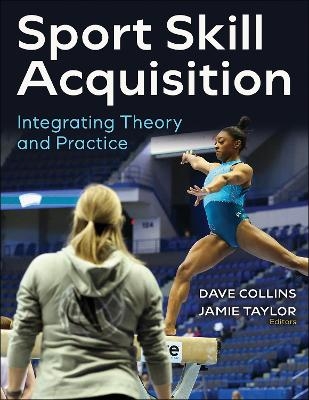
Sport Skill Acquisition
Human Kinetics (Verlag)
978-1-7182-2579-4 (ISBN)
- Noch nicht erschienen (ca. Februar 2025)
- Versandkostenfrei innerhalb Deutschlands
- Auch auf Rechnung
- Verfügbarkeit in der Filiale vor Ort prüfen
- Artikel merken
In recent decades, sport science has seen an explosion in the volume of knowledge regarding skill acquisition and motor control. Sport Skill Acquisition carefully and critically considers the expanding knowledge, with a focus on application, examining three major theoretical perspectives that dominate the field: cognitive, ecological dynamics, and predictive processing. Editors Dave Collins, PhD, and Jamie Taylor, PhD, use their combined wisdom as coaches, coach developers, and expert sport psychology practitioners to offer practical advice on blending theoretical approaches, using examples from a variety of sports and activities.
Students and practitioners across a variety of professions based on the development and refinement of effective movement—including coaches, sport scientists, physical educators, physical therapists, and trainers—will appreciate the applied focus of Sport Skill Acquisition. The text champions the connection of research to direct application using a practice termed professional judgment and decision making (PJDM), or the it depends approach, which stresses the need to carefully consider and apply the best strategy for each particular context.
Organized into four parts, Sport Skill Acquisition begins by considering the three theoretical approaches to skill acquisition. It goes on to explore how these different approaches can be used separately or in a blended form, before considering the wider ramifications of an integrated approach. Then the mental, organizational, planning, and social aspects of skill are discussed, along with practical guidance on how skill can best be planned for, developed, executed, and integrated.
Throughout the book, learning features guide readers through the content. Chapter objectives direct readers on their learning path and ensure they focus on key concepts, while chapter summaries offer a concise wrap-up of the material presented. Review questions and key terms support understanding and knowledge. Case studies and practical questions offer real-life situations that support critical thinking.
For those looking to improve their work with performers, Sport Skill Acquisition provides a road map for choosing the best approach for each unique situation to develop skills for optimal sport performance.
Dave Collins, PhD, earned a doctorate in psychology from the University of Surrey in 1990. He is currently the director of Grey Matters UK, a performance-focused company that offers applied consultancy services in sports, business, performing arts, and more. He is also a professor at the University of Edinburgh, an institution ranked in the world’s top 20 by QS World University Rankings. Collins has written over 450 peer-reviewed publications and has authored or contributed to 90 books. His research interests include performer and coach development, expertise, and peak performance. As a practitioner, Collins has worked with more than 90 world-class athletes or Olympic medalists as well as professional athletic teams and performers. He is the director of the Rugby Coaches Association, a fellow of the Society of Martial Arts, a fellow of the British Association of Sport and Exercise Sciences (BASES), and an associate fellow of the British Psychological Society. Collins is a former Royal Marine and a fifth dan in karate. Jamie Taylor, PhD, earned a doctorate in psychology from the University of Edinburgh in 2020. He is currently an assistant professor and lecturer in coaching and elite performance at Dublin City University. As a senior coach developer at Grey Matters UK, Taylor offers ongoing contributions to the development of coaches and coach supporters in athletics, netball, rugby union, football, adventure sports, and the Special Olympics. He has worked with over 150 coaches in a developmental capacity and consulted across a wide range of sports and contexts, including Olympic and Paralympic programs. While working with the English Institute of Sport, Taylor supported the creation of the Coach Developer CIMSPA standards. His research focus spans across performance enhancement in sport, specifically in coaching, coach development, high performance, and talent development.
Introduction. The It Depends Approach: Informed Decision Making Based on Contextual Needs
Dave Collins
Part I. Controlling Movement
Chapter 1. Underpinning Theories and Consequent Approaches: What Do We Want and Need From a Model?
Dave Collins and Jamie Taylor
Chapter 2. Challenges of Cognitive, Ecological, and Predictive Processing Approaches
Howie J. Carson and Jamie Taylor
Chapter 3. Sifting the Useful From the Useless: A Case for Criticality in Coaching
Loel Collins and Ray Bobrownicki
Part II. Learning Movement
Chapter 4. An Either-Or Perspective on Applying the Theoretical Approaches: Where Have They Come From, and How Valid Are They?
Howie J. Carson
Chapter 5. Blending Approaches
Michael Ashford and Jamie Taylor
Chapter 6. Performer Experience: Challenge and Fidelity
Jamie Taylor and Michael Ashford
Chapter 7. The Special Case of High-Level and Experienced Performers
Dave Collins
Part III. Performing Movement
Chapter 8. Mental Skills
Rosie Collins
Chapter 9. Athlete Management
Andrew Cruickshank
Chapter 10. Planning and Leadership Systems
Michael Ashford and Dave Collins
Part IV. Team Movement
Chapter 11. Psychosocial Dimensions: Integrating Movement and Psychological Considerations to Optimize Team Performance
Urvi Khasnis and Amy Price
Chapter 12. Team Management
Andrew Cruickshank
Epilogue. Underpinning Your Future Development: Next Steps, How to Take Them, and What to Look Out For
Jamie Taylor and Dave Collins
| Erscheint lt. Verlag | 13.2.2025 |
|---|---|
| Verlagsort | Champaign, IL |
| Sprache | englisch |
| Maße | 216 x 279 mm |
| Themenwelt | Sachbuch/Ratgeber ► Sport |
| Geisteswissenschaften ► Psychologie ► Entwicklungspsychologie | |
| Weitere Fachgebiete ► Sportwissenschaft | |
| ISBN-10 | 1-7182-2579-2 / 1718225792 |
| ISBN-13 | 978-1-7182-2579-4 / 9781718225794 |
| Zustand | Neuware |
| Informationen gemäß Produktsicherheitsverordnung (GPSR) | |
| Haben Sie eine Frage zum Produkt? |
aus dem Bereich


